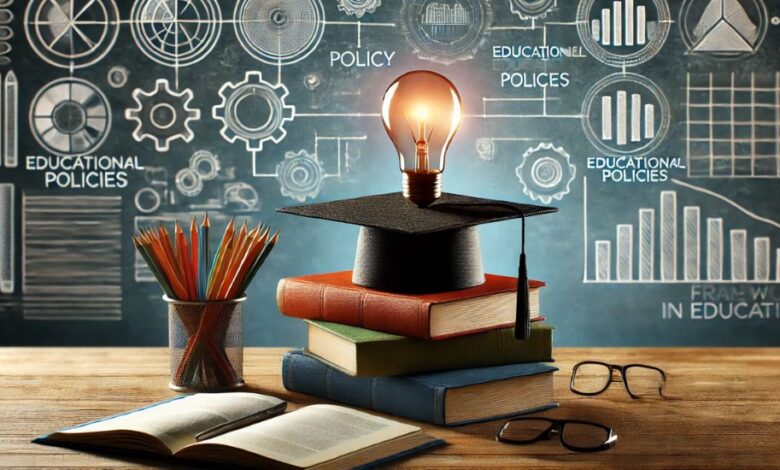A Comprehensive Overview of Policy Framework in Education: Structure, Implementation, and Impact

Introduction: In the modern educational landscape, policies play a critical role in shaping the future of learning and teaching. These policies provide structure, consistency, and guidance to educators, students, and administrators, ensuring that educational goals are met efficiently. In this article, we will explore what a policy framework in education entails, its key elements, and how it impacts educational systems worldwide. This discussion will also include a perspective from USA Magzines, as we analyze the role of such frameworks in shaping progressive and inclusive education.
What is a Policy Framework in Education?
A policy framework in education refers to the structured set of policies, guidelines, and regulations that govern the way education is delivered within a specific region or institution. It provides a blueprint for the roles, responsibilities, and expectations of all stakeholders involved, including teachers, students, policymakers, and communities. These frameworks are essential in shaping curricula, teaching standards, assessment methods, and even the allocation of resources to schools and universities.
In simple terms, the policy framework in education ensures that there is coherence in the goals of education, standardization in how education is delivered, and accountability in ensuring that quality standards are met. Whether it’s public schooling, higher education, or vocational training, the policy framework serves as the backbone that supports and defines the education system.
Key Components of a Policy Framework in Education
- Curriculum Development and Assessment StandardsThe curriculum is at the heart of any education system, and a strong policy framework in education ensures that the curriculum is both relevant and up-to-date. This includes creating subject-specific guidelines, setting learning outcomes, and integrating modern teaching methodologies. A well-structured policy also addresses how learning progress will be assessed, from classroom evaluations to standardized testing systems.
The USA Magzines perspective highlights that modern education needs a curriculum that prepares students not only for exams but also for life skills, critical thinking, and adaptability in an ever-changing global job market.
- Teacher Training and Professional DevelopmentTeachers are the key players in the implementation of any policy framework in education. Therefore, a comprehensive framework must include guidelines for teacher qualifications, ongoing training, and career development. The policy outlines what constitutes an effective teacher, including teaching strategies, classroom management skills, and the use of technology in education.
Additionally, many educational frameworks advocate for continuous professional development, ensuring that educators stay updated on new pedagogical practices and technological advancements. This is crucial for maintaining high educational standards in institutions.
- Resource Allocation and Infrastructure DevelopmentAn effective policy framework in education must address how resources such as funding, technology, and facilities are distributed across educational institutions. Equal access to quality education is a fundamental goal, and the policy must ensure that schools in both urban and rural areas are well-equipped to meet the learning needs of their students.
The allocation of resources also includes ensuring that schools have adequate teaching staff, learning materials, and physical infrastructure such as classrooms, libraries, and sports facilities. USA Magzines highlights that proper funding and infrastructure are key factors that influence student performance and overall school success.
- Inclusivity and Equal OpportunitiesA modern policy framework in education is grounded in the principles of inclusivity, ensuring that every student has access to quality education, regardless of their background. This includes creating policies that cater to students with disabilities, students from minority groups, and those from disadvantaged socio-economic backgrounds.
Inclusivity also extends to gender equality and creating safe learning environments free from discrimination. The framework provides clear guidelines on how schools can implement inclusive policies and ensure equal participation of all students in educational activities.
- Regulatory Compliance and Quality AssuranceEvery education system must adhere to certain national and international standards. A policy framework in education sets out these standards and ensures that educational institutions comply with regulatory requirements. Quality assurance mechanisms are also built into the policy framework to regularly assess the performance of schools and universities.
Through inspections, audits, and performance evaluations, the framework ensures that educational institutions remain accountable and that continuous improvements are made where necessary.
The Role of Governments and Policymakers
Governments and policymakers play a central role in developing and enforcing the policy framework in education. These entities are responsible for drafting laws and regulations that govern education at all levels. They also provide the funding and resources necessary for the implementation of educational policies.
Policymakers often consult with educational experts, teachers’ unions, parents, and students to create a balanced and effective policy framework that reflects the needs of the society. Governments also ensure that educational policies are updated periodically to reflect the changing social, economic, and technological landscape.
Challenges in Implementing Policy Framework in Education
While having a well-structured policy framework in education is essential, there are often challenges associated with its implementation. One major challenge is the disparity between urban and rural schools, particularly in terms of resources and infrastructure. Rural schools often face a shortage of teachers, lack access to technological tools, and have limited funding, which can hinder the effective implementation of educational policies.
Another challenge is the resistance to change from educators and institutions that are accustomed to traditional methods of teaching and administration. Implementing new policies often requires time, training, and a shift in mindset, which can be difficult to achieve.
The Future of Policy Frameworks in Education
As technology continues to evolve and global challenges such as climate change and economic inequality become more pressing, educational policies must also adapt. Future policy frameworks in education will likely emphasize digital literacy, environmental education, and the development of critical thinking and problem-solving skills. The integration of artificial intelligence (AI) in education will also become a crucial aspect of future frameworks.
Moreover, future policies must continue to focus on inclusivity, ensuring that no student is left behind, and that education systems are equipped to handle the diverse needs of students in an increasingly globalized world.
Conclusion
In summary, the policy framework in education is a comprehensive structure that ensures the smooth functioning of educational systems. It addresses everything from curriculum development to resource allocation, inclusivity, and quality assurance. As highlighted by USA Magzines, an effective policy framework is crucial for creating an educational environment that is both equitable and future-focused.
The role of policymakers, teachers, and communities is integral in shaping and implementing these policies, ensuring that students receive a well-rounded education that prepares them for the challenges of the future.




